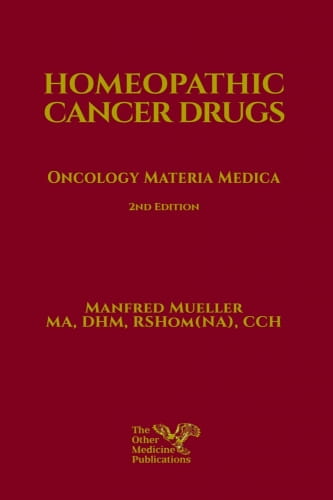THE 2ND EDITION IS IN ONE VOLUME!
A ground-breaking reference book for physicians, professionals, and patients alike.
Do you specialize or are you thinking of specializing in homeopathic cancer treatment? Do you take an occasional cancer case but wish to learn more? Then this book is for you!
Homeopathic Cancer Drugs is the first clinical materia medica written specifically with the homeopathic oncologist in mind. It contains every fact the homeopathic cancer specialist needs to know in order to treat cancerous pathologies safely, and with a higher degree of success.
Homeopathic Cancer Drugs contains over 600 remedies and is the most thorough reference work on homeopathic cancer drugs to date. It lists all drugs that have ever been used for the homeopathic treatment of cancer either in clinical practice, case studies or compiled from more than 100 years of homeopathic literature.
It is the first time the symptoms from the homeopathic materia medica have been listed in the context of modern medical categories including additions from current scientific research. It contains the broadest, most up-to-date, most complete, and most accurate array of data the practitioner needs to reliably select an effective remedy for the pathology of each individual case of cancer.
- Author: Manfred Mueller
- ISBN: 9780999185124
- 2119 pages
- Edition: Second
- Hardback
- Published in 2019
- Printed in United States
Reprinted with the permission of The Society of Homeopaths, from 'The New Homeopath' Journal, Spring 2018 edition. Reviewed by Francis Treuherz.
Manfred Mueller has created a huge dictionary in two large volumes, elucidating information on 600 remedies in great detail. He is working on a third volume, which will be a form of repertory, a therapeutic index which will relate 19th Century language to modern clinical entries.
Mueller has taken the knowledge and clinical experience of our remedies to a new level, which may help us reach a higher level of rapid, gentle cure. He calls them 'drugs' rather than remedies, as this is their legal name in the USA, regulated by the Federal Drugs Administration.
Each of the 600 chapters has 15 sub-chapters. They include identification, pathology, indications, symptomatology (by body part following the schema), differential diagnosis, interactions, aetiology, constitution, clinical notations, posology, pathogenetic trials, pharmacology, efficacy trials, case documentation, and then a list of source citations.
Conium, for example, fills 21 pages and includes 27 case descriptions of varying lengths. There must be well over 100 citations just for Conium, I lost count, from H C Allen to van Zandvoort, with plenty of Burnett and Thangapazham in between, and references from many journals. Each drug's description has a list of all sources, which relates to an eight-page bibliography at the front of both volumes.
Some substances mentioned are not yet in our materia medica, but surely will be, such as Tobacco smoke. Others are tautopathic, like Cortisonum, and other are used in low doses in allopathy like Arsenic trioxide.
I studied Cadmium next, as I recalled a case of Bell's Palsy in my first weeks of practice where I prescribed it after careful study. All the various Cadmiums are differentiated and some common errors - C sulphuratum, sulphuricum and metallicum - which have been confused in the past, are here clarified.
I looked at a small remedy, Senega, which I have only ever prescribed for debris in the eye after cataract surgery, here described for cancer in detail. The chapter on Carcinosin is superb.
The case material and drug descriptions are complex, but the organisation of the book is simple: 600 remedies in alphabetical order. There are none of the formulae or routines created in other modern texts on homeopathy and cancer. Thus more than 200 years of specialist material, patient observations and knowledge have been preserved in this incredible work of scholarship and will contribute greatly to our clinical skills.
Mueller is principal of The Homeopathic College and former chair of the North American Society of Homeopaths. This is his first book. While I enjoy studying real books I do hope that this will be incorporated into our computer software.

